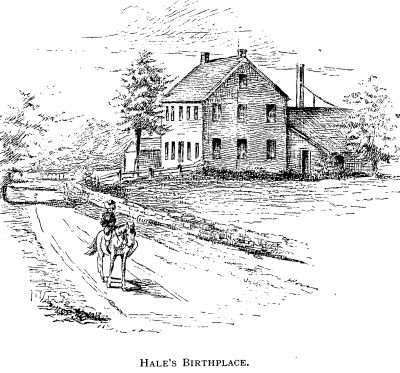Hale's Birthplace.
THE TWO SPIES
NATHAN HALE AND JOHN ANDRÉ
BY
BENSON J. LOSSING, LL. D.
ILLUSTRATED WITH PEN-AND-INK SKETCHES BY H. ROSA
ANNA SEWARD'S MONODY ON MAJOR ANDRÉ
NEW YORK:
D. APPLETON AND COMPANY,
72 FIFTH AVENUE.
1897.
Copyright, 1886,
By D. APPLETON AND COMPANY.
FORETALK.
This little volume contains a brief account of the most importantevents in the life-career of two notable spies in our War forIndependence, Nathan Hale and John André. They wereboth young men, well educated, endowed with genius and ability forconspicuous achievements, brave and accomplished soldiers, pure andvirtuous in private character, truthful, manly, refined in thoughts andmanners, handsome in person, lovely in disposition, and beloved by allwho knew them.
Yet they were spies!
"Spies," says Vattel, "are generally condemned to capital punishment,and not unjustly, there being scarcely any other way of preventingthe mischief which they may do. For this reason a man of honor, whowould not expose himself to die by the hand of a common executioner,ever declines serving as a spy. He considers it beneath him, as it canseldom be done without some kind of treachery."
May not a spy be a man of lofty honor, and act under the inspirationof disinterested patriotism? Stratagem, an artifice or scheme fordeceiving an enemy in war, is regarded as honorable, but is it notseldom exercised "without some kind of treachery"?
It is the motive which gives true character to the deed. When themotive is a purely mercenary one, the deed is dishonorable; when itis the lofty one of a desire to serve one's country or his race,unselfishly, the act is certainly honorable. Nathan Hale truthfullysaid, "Every kind of service necessary for the public good becomeshonorable by being necessary."
The motives of the two spies were expressed by themselves. Hale said:"I wish to be useful. If the exigencies of my country demand a peculiarservice, its claims to the performance of that service are imperious."André avowed that in the enterprise in which he was engaged all hesought "was military glory, the applause of his king and country, and,perhaps, a brigadiership."
The last words uttered by André under the gibbet indicated that hissupreme thought at that moment was of himself. He said to theAmerican officers present, "I request you, gentlemen, that you willbear me witness to the world that I die like a brave man." Hale's lastwords upon the ladder indicated that his supreme thought at that momentwas of his country. He said, "I only regret that I have but one lifeto lose for my country!"
In 1856 a "Life of Captain Nathan Hale," by I.W. Stuart, was publishedat Hartford, in a small volume of 230 pages. In 1861 "The Life andCareer of Major John André," by Winthrop Sargeant, was publishedat Boston in a small octavo volume of nearly 500 pages. It is anexhaustive work. To these two books I acknowledge much indebtedness.
The spirited pen-and-ink sketches which illustrate this little volumewere largely copied from original drawings by the
